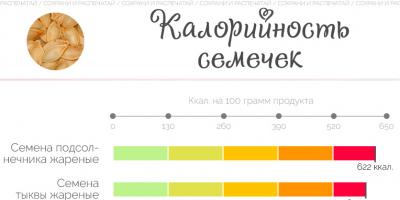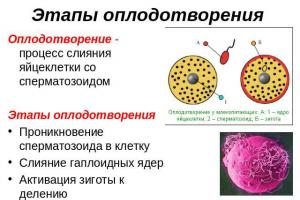How nice it is sometimes to settle down with an interesting book or movie, open a package of seeds or nuts and slowly click them, enjoying reading or watching. Such a familiar, pacifying activity that you want to prolong forever. But who would have known how many adverse effects it has, especially for those who are losing weight. It is unlikely that at the moment of relaxation, someone wonders how many calories are in seeds. But then, after the morning routine weighing, the world loses its bright colors.
The most popular, of course, are sunflower seeds, familiar to many from childhood, when huge heads of this plant, generously stuffed with black small elongated triangles, were cut off in country dachas in autumn. Grandparents fried them in a pan, and small children carried them still hot, not at all afraid of getting burned. And what then was the smell in the house! Since then, like a tribute to memories, love began. But if, at the age of broken knees with brilliant green, the calorie content of seeds - both fried and raw - could not be frightening, then as they grow older and the metabolism slows down, such harmful things, alas, began to be deposited where they should not.
In order for a moment of weakness not to overshadow the rest of your life, there is no need to walk past the department with nuts and dried fruits in a grocery store with a defiantly indifferent look, internally persuading yourself to hold out a little more. It is enough just to know the exact caloric content of seeds - both pumpkin and sunflower seeds - and what they are best used with, and, of course, remember the measure. These simple rules are enough to maintain harmony and the absence of violence against the body.
How many calories are in seeds
Sunflower seeds have the highest calorie content: as much as 603 kcal per hundred grams, which fly away in an instant. And for roasted seeds, the calorie content is even higher - as much as 700 kcal. Sometimes half a kilo imperceptibly somehow turns into just an empty husk. As a result, if you look at it this way, some two hundred grams are equal to the daily calorie intake, which can include a full breakfast, lunch and dinner. And she is recruited only by an unconscious snack, which seemed to have never happened, since the body was not completely satiated. The energy value for proteins, fats and carbohydrates is distributed as 14%, 79% and 7%. Given the fact that oil is squeezed out of them, there is nothing surprising in the second digit. And, by the way, that is why it is not recommended to drink seeds with cold water, to put it mildly: the stomach will not appreciate such “care”. But in addition to solo use with beer, they are often used in pastries and salads, and even added to cereals.
Like everything created by nature, in addition to high calorie content, sunflower seeds also have certain beneficial properties that have been known since ancient times. First of all, they are associated with a high content of vitamin E, which works as a natural strong antioxidant and restores damage from free radicals. Secondly, despite a decent percentage of fats, the cholesterol level of sunflower seeds just decreases, and does not increase, which is valuable for people suffering from atherosclerosis and hypertensive patients. However, the latter should be more careful with them because of the sodium content. In addition to it, there is a decent proportion of potassium, calcium, phosphorus and magnesium. Someone once even started a rumor that they get rid of nicotine addiction, but this fact has not been scientifically confirmed. And yet, because of the decent calorie content of sunflower seeds, it is recommended that their use be strictly controlled.
Slightly lighter pumpkin seeds with a calorie content of 556 kcal per hundred grams. They have a little less fat - 74% and more proteins - 18%, but the benefits are even more significant than in sunflowers. Moreover, they are recommended to be consumed in a raw, slightly dried form, due to the maximum preservation of positive properties. Although, unlike the previous counterpart, the calorie content of fried pumpkin seeds jumps only to the mark of 570 kcal. They are often combined with various cereals: this is a great combination to start a new day, in addition, an interesting way to combat morning sickness. And, by the way, not only in the morning: pumpkin seeds are recommended for pregnant women with toxicosis and those who suffer from motion sickness in transport. They are also able to lower blood pressure, and therefore, unlike sunflower seeds, are recommended for use by hypertensive patients. It is also a good helper for diabetics, as they reduce blood sugar levels, and those who suffer from stools: they are a natural laxative. But still, because of the high calorie content, pumpkin seeds should not be too carried away, so as not to increase your own weight. In addition, those who have stomach acidity deviates upwards should be careful with them.
Few people know that the matter does not end with pumpkin and sunflower seeds. Apple seeds are also suitable for food, as a natural source of iodine, but they are allowed to eat no more than five pieces a day due to the content of toxic substances. And safer, but less well-known, are watermelon seeds with a calorie content of 557 kcal. Yes, yes, they are also used, oddly enough, and, moreover, it is beneficial. According to the distribution of energy value, they are close to pumpkin: 77% fat, 20% protein, 11% carbohydrates. The beneficial effect lies in the high content of protein and amino acids required for muscles, and also due to the special substance in its chemical composition, watermelon seeds lower blood pressure and normalize glucose levels and carbohydrate metabolism. The high content of iron for the "birth" of new red blood cells helps to overcome anemia, lethargy and reduced performance. And in terms of zinc and magnesium, watermelon seeds stably keep ahead of many products: the first in them is one hundred grams, two-thirds of the daily norm, and the second is generally one and a half times more than the required amount. But unlike the previous species, watermelon should be eaten fried: the calorie content of the seeds will increase slightly, but digestion will be easier. And, in addition, they must be chewed thoroughly, and not swallowed whole.
Seeds in the diet of those who follow the figure
 Despite the disappointing results of finding out how many calories are in seeds, they must be included in the menu. But there are some caveats here. Firstly, of course, they should not be eaten before bedtime, but in the morning, like any “heavy” foods. Secondly, to observe certain boundaries, beyond which it is unacceptable to go. Because if you should not be afraid for the calorie content of pumpkin seeds, taken in the amount of a couple of spoons, to add to morning porridge, then they, during a snack, and even tenfold, of course, will affect the figure. And not in the way you would like.
Despite the disappointing results of finding out how many calories are in seeds, they must be included in the menu. But there are some caveats here. Firstly, of course, they should not be eaten before bedtime, but in the morning, like any “heavy” foods. Secondly, to observe certain boundaries, beyond which it is unacceptable to go. Because if you should not be afraid for the calorie content of pumpkin seeds, taken in the amount of a couple of spoons, to add to morning porridge, then they, during a snack, and even tenfold, of course, will affect the figure. And not in the way you would like.
Among the seeds, the most popular are fried sunflower seeds. Pumpkin seeds, flaxseeds and others are also eaten. Sunflower seeds are prepared in several ways - dried, fried without oil or in oil, with or without salt.
Roasted without oil, seeds contain more than 50% vegetable fat - this is the main source of calories in seeds. In addition to fats, seeds contain proteins (a little more than 20% of the mass) and carbohydrates (about 11.5% of the mass), as well as dietary fiber (about 8.5% of the mass). Naturally, the fat content, and hence the calorie content of seeds prepared using oil, will be significantly higher.
Seeds are rich in vitamins and microelements - they contain vitamins A, E, C, PP, D, B vitamins, choline, as well as calcium, magnesium, sodium, potassium, phosphorus, iron, zinc, copper, manganese and selenium. This composition makes the seeds quite useful - they have a beneficial effect on the condition of hair, nails, skin, strengthen bones and blood vessels, neutralize antioxidants and slow down the aging of the body. They also stimulate brain activity, normalize metabolism, regulate the level of insulin in the blood, help cleanse the blood of cholesterol and increase hemoglobin.
However, seeds also have harmful qualities - for example, they harm tooth enamel when they are bitten, they contain cadmium, which is a rather dangerous substance for humans, they are not very useful for the gastrointestinal tract, as they contain a lot of fat and can also provoke heartburn. The high calorie content of seeds has its drawbacks.- on the one hand, the high calorie content of seeds and their significant nutritional value make them an excellent option for a snack on the run, on the other hand, they are dangerous for the figure, as they can lead to excess weight.
The high fat content of seeds makes this product very difficult for digestion, it is especially harmful to eat seeds in the evening - they will be digested all night, your digestive system will work and will not allow you to fully rest. At the same time, all the calorie content of the seeds that you ate in the evening will be directed to body fat, because the body has nowhere to put so much energy at night. However, you can eat seeds in small quantities, it is also useful to add them to pastries or bread or other dishes - they increase the nutritional value of dishes and give them some piquancy.
Pumpkin seeds are much healthier than sunflower seeds. The calorie content of pumpkin seeds is lower than sunflower seeds, they contain much less fat(within 20% of the mass), but they have more carbohydrates (they make up almost 54% of the mass). Proteins in pumpkin seeds are about 18.5% of the mass, they also have quite a lot of fiber - about 18.5% of the mass. Pumpkin seeds are cadmium-free, high in fiber and complex carbohydrates, and lower in fat than sunflower seeds. In addition, they are high in omega-3 and omega-6 unsaturated fatty acids, which makes them extremely beneficial for children, adolescents and women, especially during pregnancy or lactation.
How many calories are in sunflower seeds
As mentioned above, how many calories are in sunflower seeds depends on the processing method. And if the calorie content of seeds dried without frying or fried without oil is approximately the same and is about 582-584 kcal per 100 g, then the calorie content of seeds fried in oil can reach up to 600 kcal and even higher.
At the same time, almost 300 kcal of this number of calories are found in fats. The fats in seeds are represented by both unsaturated and saturated fatty acids. If unsaturated fatty acids are relatively easily broken down and used by the body for good, then saturated fatty acids are difficult for him to break down, so he sends them to his warehouse stocks.
About 120 kcal of the calorie content of seeds per 100 g are contained in proteins. These calories are released when proteins are broken down into amino acids and used for energy. However, for 1 meal, the human body cannot digest more than 30-40 g of protein, so everything that you eat in excess of this amount will not be absorbed and will turn into toxins. The remaining calories are found in carbohydrates - about 65 kcal.
Calories in pumpkin seeds
Due to the lower fat content compared to sunflower seeds, the calorie content of pumpkin seeds is also significantly lower and amounts to 446 kcal per 100 g. When roasted in oil with salt, the calorie content of pumpkin seeds becomes higher - about 540 kcal per 100 g. Pumpkin seeds do not have such a heavy effects on the digestive system, like sunflower, and they are much more beneficial to use.
seeds for diet
 Despite the high calorie content and their controversial, both useful and harmful properties, seeds are a fairly popular product - almost everyone clicks them, and often people have a question: is it possible to eat seeds with a diet?
Despite the high calorie content and their controversial, both useful and harmful properties, seeds are a fairly popular product - almost everyone clicks them, and often people have a question: is it possible to eat seeds with a diet?
Of course, due to the high calorie content of seeds, most diets attribute them to products that are strictly prohibited. However, it is worth remembering the great nutritional value of seeds - they contain proteins, amino acids, healthy fatty acids, fiber, complex and simple carbohydrates. Therefore, it is sometimes advisable to diversify your diet with this product - of course, in strictly limited quantities.
There are seeds in the diet you need not in its pure form, but as an additive to various products. For example, seeds can be added to salads, cereals, pancakes and pancakes, pastries or homemade bread, meat dishes, vegetable stews. Raw seeds are most useful during diets, because fried seeds retain less nutrients and nutrients.
If you are choosing between sunflower and pumpkin seeds, opt for the latter - calorie content of pumpkin seeds is less, and there are more useful substances in them. The optimal daily amount of seeds for a diet is 20-30 g. That is how many nutrients from seeds the body can absorb per day - if this norm is exceeded, it will send the excess to adipose tissue.
Diet recipes with seeds
We offer you several recipes for dishes with seeds that you can cook while on a diet. A hearty energy breakfast will be oatmeal steamed for 20 minutes in boiling water, to which finely chopped prunes and dried apricots are added, a teaspoon of sunflower and pumpkin seeds, a teaspoon of crushed walnuts, a teaspoon of honey, a pinch of ginger and cinnamon and salt to taste. Such porridge is especially useful, since it is not boiled, but steamed, which means that more useful substances remain in it.
Another dish with seeds for a diet is a vegetable salad with feta cheese and chicken. Boil the chicken breast, cut it, add 2 tablespoons of canned corn, half a tablespoon of sunflower and sesame seeds, a teaspoon of linseed, 1 chopped tomato, 1 chopped bell pepper, chopped half an onion, crushed garlic clove, chopped basil, parsley , sorrel and lettuce, Chinese cabbage, 150 g diced feta cheese, a spoonful of lemon juice, a spoonful of olive oil and a little black pepper.
If you liked this article, please vote for it:(25 Votes)
Sunflower is an unpretentious, and therefore very common plant in the world. Central Mexico is considered its homeland, there are references to the use of culture in the economy of the Indian tribes of North and South America more than two thousand years ago.
Despite the fact that one-year-old sunflower is an alien crop for Russia, it is our country that today produces it the most. Along with Argentina and Ukraine, Russia exports tons of valuable products abroad, although even in the Soviet Union this raw material was imported from abroad for the needs of the food industry.
Product Features
Among the people, sunflower seeds are common as an independent product. In the diet, it is used separately, as a snack. It is customary to use "seeds" after meals, "husk" during rest. Popularization of the product is facilitated by its "lightness", the ability to occupy hands for a long time, as well as its valuable composition. It is widely believed that sun plant seeds are incredibly beneficial.
Seed composition. How many nutrients are in seeds
This opinion is justified, since the seeds contain many valuable and necessary elements for a person. Nearly eighty percent of each sunflower seed is fat, of which only twenty percent is saturated.
There is no cholesterol in the product at all, therefore, its use does not affect the health of blood vessels and the circulatory system. But in abundance - other components, each of which plays a significant role in the metabolic processes of our body.
- Vitamin E. Contained in linenoleic and oleic unsaturated fatty acids in the composition of fruits. One hundred grams of the product accounts for more than one hundred and thirty percent of the daily norm of tocopherol, which a person must consume in order to maintain the work of the heart and blood vessels, clarity of thought and beauty of the skin.
- B group vitamins. The product contains from thirty-five to seventy percent of the daily intake of vitamins B3, B5, B6. They are necessary for our body for the correct functioning of the nervous system, normalization of sleep. The condition of the skin also depends on the consumption of these vitamins. Their deficiency is manifested by dandruff and rashes on the face.
- Phosphorus, selenium. Their daily rate in one hundred grams of the product exceeds one hundred percent. Trace elements provide bone strength and are one of the most important components of healthy and youthful skin.
- Magnesium, potassium, zinc. The main components of the health of the circulatory system are contained in up to forty percent of the daily intake. Magnesium and potassium are vital for the heart, and zinc takes care of strong immunity, beautiful skin and hair.
The composition of sunflower seeds is a storehouse of components for beauty and youth. One hundred grams of the product contains everything necessary to maintain the tone and vitality of the skin, hair, heart and blood vessels. This composition determines the beneficial properties of sunflower seeds. In addition, the seeds contain vegetable fiber, which improves bowel function.
Harm
However, such a rich composition has a downside. A high concentration of fats in the product invariably affects the state of the body, and does not always change it for the better.
- Fat is the easiest for the body to digest. If our body has to work hard to process protein, that is, expend energy on digestion, then fats are absorbed almost independently. This makes them the main light source of energy, and when there is nowhere to spend it - the basis for the formation of fat "deposits". Consisting of eighty percent fat, the seeds quickly transform into adipose tissue, being eaten in the evening on the couch.
- Seeds are high in calories. The calorie content of the product is extremely high. It is five hundred and eighty calories per hundred grams. For comparison, a similar “dose” of calories contains a serving of pork kebab, and in a bar of chocolate the calorie level is two times lower than in a glass of “seeds”. That is why the product should be used with extreme caution, since in addition to the obvious benefits, it contributes to the formation of excess weight.
- harmful components. In 2010, activists of the society for the protection of consumer rights "Public Control" conducted a study of the composition of packaged sunflower seeds sold on the Russian market. The most popular brand names of the product were investigated. In each of them, an excess of a dangerous component - cadmium - was revealed. This substance penetrates into products from the soil and water, and enters the human body unchanged. Cadmium accumulates in tissues and causes pathological processes. At a high level of consumption within 0.6 milligrams per day, it is life-threatening. In the middle of the last century, fatal cases of cadmium poisoning were recorded in Japan. Relatively safe is the rate of consumption of the substance up to 0.07 milligrams per day. In the tested samples of seeds, the content of a dangerous component was recorded in the range of 0.02 milligrams per hundred grams of the product. Increases the daily "dose" of cadmium active and passive smoking. Smoking a pack of cigarettes, a person receives an additional 0.02 milligrams of the most dangerous substance.
- danger to tooth enamel. The harm of sunflower seeds consists in an intense mechanical effect on white teeth, which provokes damage to tooth enamel. Regular exposure to the husk contributes to the formation of cracks and intensive destruction of dental tissues, creates conditions for the development of carious formations. It's bad to bite them.
It is also important to take into account that the composition of the product is not stable, it depends on the duration of storage, the characteristics of heat treatment. Fried sunflower seeds lose most of their useful components and serve only as sources of "empty" calories.
Rules for the use of sunflower seeds
Consider the main misconceptions that accompany the use of sunflower seeds.
- With high cholesterol, the product is prohibited. The sunflower seed has nothing to do with the level of cholesterol, since this harmful component is not present at all. You can use it even with atherosclerosis.
- With diabetes, seeds cannot be peeled. Seeds do not have a direct effect on blood sugar levels, so if you have diabetes, eating them is not prohibited. But it is important to take into account the high calorie content of the product, which is fraught with additional weight gain in insulin-dependent type 2 diabetes.
- For pregnant women, the product is dangerous. Again a myth. The composition of the seeds does not adversely affect the health of mother and baby. The main restriction is precisely the calorie content. The rule: little and often is better - it works here to the fullest.
- When breastfeeding, it can disrupt the baby's digestion. There is a rule for the use of all products without exception with HB. If you ate them during pregnancy, the baby's body is already familiar with them, and they can be considered relatively safe. But a nursing mother should monitor the reaction of the crumbs. If everything is in order with the tummy, there are no allergic manifestations, you can eat any product, including seeds. It is only important to observe moderation, since even from the safest food components, but eaten in large quantities, negative reactions from the child's digestion may occur.
- For children, the use is fraught with appendicitis. Neither for men, nor for women, nor for babies, the relationship of sunflower seeds with inflammation of the caecum has been proven, and the product does not affect the liver. It is impossible to "eat" appendicitis with seeds. The main thing at night is not to abuse the product.
- When losing weight, eating seeds is prohibited. Why? Despite the fact that sunflower seeds are an extremely high-calorie product, you can use them with a diet. They compensate for the lack of fat, which is necessarily formed with a dietary diet with an abundance of protein foods and vegetables.
It is believed that you can eat seeds at any age, since the unsaturated fatty acids that make up the composition are equally useful for both young and old people. However, doctors do not recommend eating seeds for the elderly and those who suffer from joint diseases. An excess of unsaturated fatty acids in the diet causes even more inflammation of the joint tissues.
Choice
In order for the benefits of sunflower seeds to be fully manifested, follow the basic rules for choosing a product.
- Only in the skin. Cleaned yards are safe for tooth enamel, but they have no practical value for the body. In contact with air, the fats included in their composition quickly oxidize and lose their beneficial qualities. Buy sunflower seeds only in their skins.
- New harvest. Look at the packaging date of the product. Seed collection time is September-October. Nucleoli packaged in autumn contain significantly more valuable components than those packaged in spring. During storage, the oils in them become rancid, in addition, at an increased level of humidity, the raw materials become rotten and acquire an unpleasant taste.
- Not roasted, not salted seeds. There is nothing useful in fried kernels, except for vegetable fiber. It is unwise to consume them as a source of vitamins and minerals. Salt does not affect the composition of the product, but it does not bring benefits to the body either. Excess salt in the diet causes swelling, prevents weight loss. It is good to eat it pure.
Unfortunately, the choice of a quality product in supermarkets is limited. On sale are sunflower seeds in packages fried and with salt. Refuse to buy them, preferring a natural product. You can find one in grocery markets. Seeds are sold by weight from large bags, in bulk.
Norms and preparation
Earlier in dietology, the daily measure of consumption of sunflower seeds was determined by twenty to thirty grams per day. However, according to scientists, this measure is outdated. Specialists of the Kuban State Technological University M.V. Stepuro and V.G. Lobanov in 2008 conducted a study of raw materials in terms of the main indicators of quality and composition.
Scientists noted that in recent years, most varieties of annual sunflower have been replaced in the fields by hybrids. The advantage of the latter is their high resistance to diseases and negative natural factors. They are also attractive for the production of vegetable oil, as they have an increased fruit share, an increased fat content. So the proportion of lipids in high-oil varieties, as hybrids are called, increased from thirty-seven to fifty-two percent.
Increasing the fat content of the product should be taken into account when using it. The safe intake should be reduced from thirty to fifteen to twenty grams. You need to eat a small amount of seeds so that there is benefit, not harm.
You should also properly prepare the product.
- Wash the seeds. Grown on the field, they were stored for some time at the current, poured into bags, transported to the place of sale. They cannot be absolutely pure. Rinse them under running water before cooking. It is convenient to do this in a sieve or colander.
- Cook without oil. Frying seeds in vegetable oil is like eating butter with fatty homemade sour cream. Also, do not add salt during cooking.
- Don't fry. The best way to preserve valuable substances is to dry the product slightly. It is convenient to do this in the oven or microwave. Keep your cooking time to a minimum.
Don't crush the seeds with your teeth. After all, everyone wants to have a beautiful smile. Restoring tooth enamel is impossible, sooner or later, but you will have to seek expensive dental care for dentures. Remove the husks with your hands, peeling the grains with your thumb and forefinger.
The habit of shelling seeds can make it difficult to get a visa to a country where fingerprint scanning is required for registration. Skin growths form on the fingertips, which deform and smooth out the natural pattern.
Storage
Raw sunflower has a critically low resistance to external conditions. At elevated temperatures, it can deteriorate in just a few hours. The normal storage temperature for it is no more than ten degrees Celsius with a seed moisture level of up to twenty percent.
Therefore, seeds must be stored in the refrigerator. They tolerate temperatures well from zero to eight degrees. Such conditions block oxidative processes, while maintaining a high level of quality of oilseeds.
sunflower seeds- seeds of the plant of the same name of the Compositae family. They are used as a raw material for the preparation of sunflower oil, and also in fried form are consumer goods. The most famous brands at the moment are "Seeds from Martin", "Babkiny Seeds", "Plevoe Delo", "Fishka".
The calorie content of roasted sunflower seeds per 100 grams is from 350 to 600 kcal
According to the data of manufacturers of roasted sunflower seeds in Russia, 100 g of Babkiny Seeds from Troll LLC contains 581 calories, 27 g of proteins, 8.5 g of carbohydrates, 49 g of fat, and "Seeds from Martin" from Martin LLC 578 calories, 20.7 g protein, 52.9 g fat, 5 g carbs. The product also contains calcium, phosphorus, magnesium, potassium, selenium, tocopherol, folic acid, niacin and other biologically active substances.
Benefit and harm
The basis of sunflower seeds is dietary fiber, which stimulates the contraction of the smooth muscles of the digestive tract and, accordingly, the motility of organs, improves the excretion of metabolic products, toxins, salts of heavy metals.The product contains large amounts of polyunsaturated fatty acids. They regulate lipid metabolism in the human body, prevent an increase in the concentration of cholesterol and low-density lipoproteins in the blood, and reduce the risk of atherosclerosis. This type of fat also contributes to the synthesis of phospholipids necessary for building the cell membrane.
Magnesium, together with B vitamins, reduces increased anxiety, inhibits the excitability of the nervous system, and restores tissue activity after the negative impact of a stressful situation.
Zinc and tocopherol (vitamin E) have a positive effect on the structure of hair and nails, increase the elasticity of the skin, slow down the aging process and the appearance of wrinkles. Vitamin E is a natural antioxidant and protects the body from the onset of the development of the tumor process.
Calcium, phosphorus and vitamin D, through complex biochemical processes, regulate each other's concentration in bone tissue, giving it density and resistance to mechanical influences from the outside. Without these elements in children in the process of formation of the musculoskeletal system, a disease such as rickets appears, characterized by underdevelopment and deformation of the bones.
Selenium performs many useful functions, the main ones are stimulation of the immune system, stabilization of metabolic processes, normalization of the release of hormones, in particular sexual ones. The trace element is also involved in the formation of red blood cells and the prevention of the development of malignant neoplasms.
Fried sunflower seeds should not be eaten by people suffering from inflammatory diseases of the stomach and intestines, as coarse dietary fiber additionally irritates and injures the mucous membrane of the organs.
The most harmful component in seeds is cadmium. It accumulates in the product due to the close location of fields with sunflowers to the route. It is in the exhaust gases of the car is a harmful chemical element. Cadmium is a heavy metal, its salts negatively affect the functioning of the liver, kidneys, and heart.
Calorie content of roasted sunflower seeds (per 100 grams):
Roasted Babkina seeds
Seeds from Martin selected
Roasted Kuban seeds
Golden parrot seeds
Sunflower seeds Kuban selected
In domestic culture, roasted seeds are an extremely popular product. They like to eat them in the company of friends, while attending social events, watching movies. Luckily, this plant-based diet contains a lot of useful substances. Nevertheless, many people want to know if they get fat from seeds? What is their energy value, mineral and vitamin composition? Does the use of roasted seeds cause significant harm to health or is this another misconception? We will look for answers to these questions in our article.
Vitamin and mineral composition

Do you get fat from roasted seeds? It is rather difficult to call such a product dietary, despite the presence of a wide list of useful properties. Due to their protein base, seeds are extremely high in calories. There are about 578 kcal per 100 g of raw materials.
To understand whether they get fat from fried seeds or not, you should pay attention to such a visual comparison. The nutritional value of 100 g of sunflower seeds is the same as:
- Servings of pasta or two bowls of boiled rice.
- Bars of natural, dark chocolate.
- Loaves of wheat bread.
- Grilled steak.
Considering the foregoing, you can independently answer the question, do you get fat from fried sunflower seeds? It is certainly not recommended to include such a high-calorie product in the diet program.
Harm of seeds

Do they get fat from seeds? Rapid weight gain is not the most serious consequence of the frequent use of such a product. Among other negative aspects of eating fried seeds, it is worth noting:
- Damage to tooth enamel, the appearance of yellow plaque.
- Harmful effect on the liver and kidneys.
- Development of a sensation of heartburn.
- concentration of cadmium in the body.
- Negative effect on the vocal cords.
Features of use

Do seeds get fat? It is most realistic to gain weight quickly when eating sunflower seeds after meat dishes. On the contrary, in order to maintain normal forms, you should eat seeds in combination with diet cereals or plant foods. If there is an acute desire to eat roasted seeds, then it is advisable to take time for physical activity.
In diabetes, it is advised to include dried seeds in the diet. The same applies to cases of high cholesterol.
It is recommended to use seeds for children, because the product contains a significant amount of useful proteins and amino acids. However, it is necessary to give seeds to babies in controlled quantities, about 15-20 pieces several times a week.
Is it possible to get better from seeds while on a diet? In the process of losing weight, it is worth eating several seeds for prevention. With this approach to building a diet, the amount of fat in the body is replenished, the lack of which is felt when refusing food of animal origin.
Do seeds get fat?

It is believed that only about 40 g of fried sunflower seeds can be consumed daily without fear for the figure. However, here the dangerous property of such a product comes into play - it is quite difficult to refuse it. Therefore, in most cases, it is impossible to limit oneself to eating such a small amount of seeds. The rate of consumption naturally increases during communication with friends or while watching television programs. People who suffer from excess weight should try to give up fried seeds for a month. The difference in appearance before and after will be simply obvious.
Contraindications

Sunflower seeds should not be consumed by people who suffer from the following diseases:
- Gastric ulcer.
- Colitis.
- Gout.
- Disruptions in the work of the intestines.
How to properly prepare seeds for consumption?
When preparing sunflower seeds for consumption, it is important not to subject them to prolonged frying. Indeed, in this case, the bulk of useful substances disappear from the composition of the product. It is much more useful to use seeds that are only slightly dried in the oven. Excessively overcooked seeds in vegetable oil are a dangerous product in which carcinogens are formed.
There are manufacturers who do not wash the seeds before cooking. Thus, the consumer, in addition to fried seeds, comes across all kinds of garbage particles, dust and dirt in bags. Contact with harmful bacteria can not only lead to food poisoning, but also provoke the development of infections. It is for this reason that it is highly recommended to cook the seeds yourself.
Benefits of pumpkin seeds
So we found out whether they get fat from sunflower seeds. Now let's look at whether you can gain weight by eating pumpkin seeds, find out what properties they have.
It is immediately worth noting that pumpkin seeds are considered a dietary product. Eating them leads to a decrease in appetite. In the process, there is no change in insulin levels in the blood. Therefore, people who suffer from diabetes are advised to use pumpkin seeds.
According to the nutritional value, such food is comparable to walnuts. If a person is on a diet for weight loss, you should not eat more than 30 g of pumpkin seeds per day. At the same time, it is absolutely not recommended to season them with salt. Since in this case, the processes of removing fluid from the body are significantly slowed down.
Finally
For some people, seeds are like a drug. A person who consumes sunflower seeds one by one falls into a state of a kind of trance. The process is very relaxing. But at the same time, uncontrolled consumption of sufficiently fatty protein foods occurs.
So, do seeds get fat? It all depends on the individual consumer. After all, not every lover of fried seeds is able to say "stop" to himself in time. So, in one evening you can quietly "sort out" calories, the number of which significantly exceeds reasonable limits.








